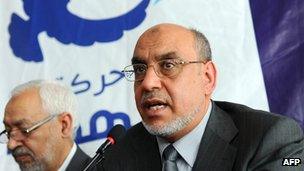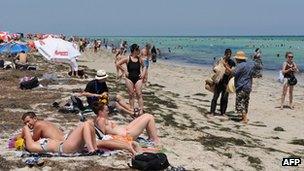Tunisia Islamists to form new government within a month
- Published

Hamadi Jebali (R) has been put forward by Tunisia's Islamist party as the next prime minister.
Tunisia's moderate Islamist party Ennahda, has said it will form a new government within a month.
Preliminary results for Sunday's election give it a commanding lead, but not an overall majority, in the first democratic elections prompted by the Arab Spring uprisings.
Ennahda has put forward its number two, Secretary General Hamadi Jebali, as the next prime minister.
Coalition talks with secular parties have begun.
Mr Jebali, 62, is an engineer by training and a former journalist. He was a co-founder of Ennahda.
A vehement opponent of the ousted president, Zine el-Abidine Ben Ali, Mr Jebali spent 16 years in jail - 10 in isolation - for his political activities.
Party leader Rachid Ghannouchi was not an election candidate and has said he had no government ambitions.
He has pledged not to set up an Islamist state and to respect multi-party democracy.
Ennahda, which was banned under the former regime, said it modelled itself on the governing AKP party in Turkey, another Muslim-majority country which has remained a secular state.
No bikini ban
It sought to reassure secularists and investors, nervous about the prospect of Islamists holding power in one of the Arab world's most liberal countries, by saying it would not stop tourists wearing bikinis on the beaches nor impose Islamic banking.
Foreign tourism is a major source of revenue for Tunisia.

Tunisia's Islamists promise there will be no bans on bikinis and alcohol.
"The tourism sector is among the achievements which we cannot touch. Is it logical to handicap a strategic sector like tourism by forbidding wine or wearing bathing costumes?" Mr Jebali said.
"These are individual liberties granted for foreigners and Tunisians alike."
Referring to the finance sector, Mr Jebali said: "Islamic banks will not be established across the country, the banking system in Tunisia will not be changed and the activity of businessmen will not be limited. On the contrary, they will be backed for attracting Arab and foreign investments."
"These fears are unwarranted," he said.
Leftist partners
Ennahda's possible coalition partners are on the leftist, liberal side of the political spectrum.
The biggest secular party, Congress for the Republic (CPR), has defended its negotiations with Ennahda, saying the Islamist party was neither the devil nor the Taliban.
"No, no, no it is not the devil and we do not make pacts with the devil," CPR leader Moncef Marzouki said.
"One must not take them for the Taliban of Tunisia. It is a moderate part of Islam," he said.
Mustapha Ben Jafaar, leader of Ettakatol, another centre-left party, has said coalition talks have already started.
He told the AFP new agency that a broad-based executive was required, to avoid "polarisation between Islamists and modernists".
The polls were Tunisia's first democratic elections, and followed the fall of President Ben Ali, who was overthrown in January after mass demonstrations. He had been in power for 23 years.
However, unlike its eastern neighbour Libya, Tunisia's transition from authoritarian rule has been largely peaceful.